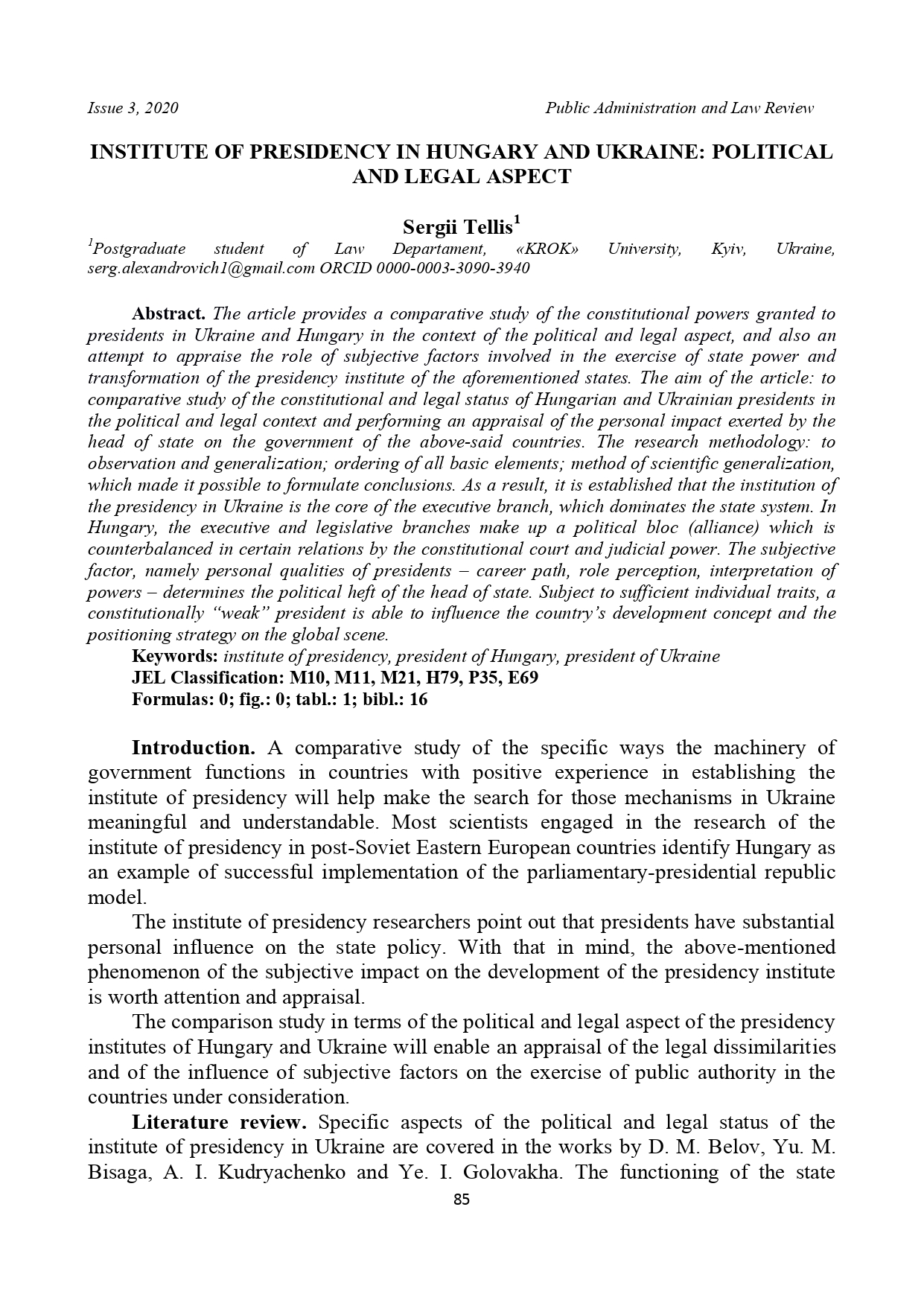INSTITUTE OF PRESIDENCY IN HUNGARY AND UKRAINE: POLITICAL AND LEGAL ASPECT
DOI:
https://doi.org/10.36690/2674-5216-2020-3-85Keywords:
institute of presidency, president of Hungary, president of UkraineAbstract
The article provides a comparative study of the constitutional powers granted to presidents in Ukraine and Hungary in the context of the political and legal aspect, and also an attempt to appraise the role of subjective factors involved in the exercise of state power and transformation of the presidency institute of the aforementioned states. The aim of the article: to comparative study of the constitutional and legal status of Hungarian and Ukrainian presidents in the political and legal context and performing an appraisal of the personal impact exerted by the head of state on the government of the above-said countries. The research methodology: to observation and generalization; ordering of all basic elements; method of scientific generalization, which made it possible to formulate conclusions. As a result, it is established that the institution of the presidency in Ukraine is the core of the executive branch, which dominates the state system. In Hungary, the executive and legislative branches make up a political bloc (alliance) which is counterbalanced in certain relations by the constitutional court and judicial power. The subjective factor, namely personal qualities of presidents – career path, role perception, interpretation of powers – determines the political heft of the head of state. Subject to sufficient individual traits, a constitutionally “weak” president is able to influence the country’s development concept and the positioning strategy on the global scene.
Downloads
References
D. I. Tkach. Modern Hungary in the Context of Social Transformations: Monograph / I. F. Kuras Institute of Political and Ethno-national Research, National Academy of Sciences of Ukraine. - K.: MAUP, 2004, 504 pages.
G. I. Zelenko. Institute of Presidency in Ukraine in the Contemporary Historical and Politology Discourse of Ukraine. – Ukraine, Kyiv, 2017. – 20 pages. [Electronic resource] – Available at: http://elibrary.ivinas.gov.ua/442/1/Zelenko_2017_3.pdf
D. I. Tkach. Role of Subjective Factor in Foreign Policy of Ukraine in times of President Leonid D. Kuchma. 2018. [Electronic resource] – Available at: https://sp-sciences.io.ua/s2631968/tkach_dmytro_2018_._role_of_subjective_factor_in_foreign_policy_of_ukraine_in_times_of_president_leonid_d._kuchma._social_and_human_sciences._polish-ukrainian_scientific_journal_02_18_
Political System and Civic Society: European and Ukrainian Realities: Monograph / Under the general editorship of A. I. Kudryachenko, Doctor of History, Professor. – K.: NISS, 2007. – 396 pages. [Electronic resource] – Available at: http://old.niss.gov.ua/book/Kudr_mon/05.pdf
D.M. Belov, Yu. M. Bisaga. Experience of Legal Constitutional Regulation of the Presidential Institution in Foreign Countries. Monograph. – Uzhgorod: Lira, 2007. – 275 pages.
Ye.I. Golovakha. Political System for Ukraine: Historical Experience and Challenges of Modernity [comprehensive research] / [O. G. Arkusha et al.; editorial board: V. M. Litvin (head) et al.]; National Academy of Sciences of Ukraine, Institute of History of Ukraine, I. F. Kuras Institute of Political and Ethno-national Research. – Kyiv: Nika-Center, 2008. – 986 pages. [Electronic resource] – Available at: http://irbis-nbuv.gov.ua/ulib/item/UKR0001524
B.L. Demianenko. Genesis of the Institute of Presidency in Ukraine. [Electronic resource] – Available at: http://dspace.nbuv.gov.ua/bitstream/handle/123456789/26663/03-Demyanenko.pdf?sequence=1
S.O. Tellis. Institute of Presidency in Ukraine 1991-2014: Historical and Legal Aspects, Subjective Factors and their Consequences (Part 2). 2018. [Electronic resource] – Available at: http://library.krok.edu.ua/media/library/category/zhurnali/pravnychyi-visnyk-universytetu-krok/pravnychyi-visnyk-universytetu-krok-n30.pdf
Bills registered by Verkhovna Rada of Ukraine. [Electronic resource] – Available at: (http://w1.c1.rada.gov.ua/pls/zweb2/webproc2)
M. Aleksieyevets, J. Seko. Ukraine’s Foreign Policy: From Multidirectional to No Alternative. [Electronic resource] – Available at: http://dspace.tnpu.edu.ua/bitstream/123456789/6936/1/Aleksieyevets.pdf
Gulyás András. Göncz Árpád a demokráciáért, a demokrácia kialakulásáért [Electronic resource] – Available at: http://www.gonczarpad.hu/goncz_arpad_a_demokraciaert_a_demokracia_kialakulasaert&prev=search
Tükör által világosan. [Electronic resource] – Available at: http://www.gonczarpad.hu/tukor_altal_vilagosan
LŐRINCZ TAMÁS. Göncz Árpád mindig keményen harcolt. 2015. [Electronic resource] – Available at: http://www.origo.hu/itthon/20151008-igazi-harcos-volt-goncz-arpad.html
M. A. Usievych. A Decade of Reforms in Hungary. The 1990s. // Modern and Contemporary History. – 2002. – #5. – Pages 80–97. [Electronic resource] – Available at: https://www.ckofr.com/istoriya/213-desyatiletie-reform-v-vengrii-90-e-gody-20-veka?showall=1
Constitution of the Republic of Hungary (Act XX of 1949). The 1949 edition of the Constitution incorporates all amendments implemented up to 2010 inclusive. [Electronic resource] – Available at: http://www.wipo.int/wipolex/ru/text.jsp?file_id=190398
Constitution of Ukraine. Document 254к/96-ВР, first edition = adopted on 28.06.1996. [Electronic resource] – Available at: http://zakon.rada.gov.ua/laws/show/254к/96-вр/ed19960628?lang=uk

Additional Files
Published
How to Cite
Issue
Section
License
Copyright (c) 2020 Scientific Center of Innovative Researches OÜ

This work is licensed under a Creative Commons Attribution 4.0 International License.





